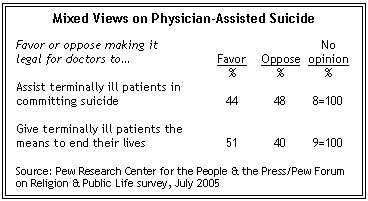by David Masci, Senior Research Fellow, Pew Forum on Religion & Public Life
Ten years ago this month, Oregon enacted a law permitting physicians to prescribe a lethal dose of drugs to certain terminally ill patients, a practice often called physician-assisted suicide. The Death with Dignity Act, which took effect on Oct. 27, 1997, is the only law of its kind in the United States, making it an important and controversial milestone in the nation’s debate over end-of-life treatment.
A number of other countries, including the Netherlands and Belgium, allow physician-assisted suicide. In the United States, several other states — including Vermont, Michigan and Washington — have considered measures to legalize physician-assisted suicide, but efforts to enact such laws have failed either in the state legislature or at the ballot box. The most recent attempt, in California, stalled in the state assembly earlier this year.
Oregon’s law applies only to patients who are terminally ill and likely to die within six months, a diagnosis that must be confirmed by two physicians. In addition, eligible patients must possess the mental capacity to give informed consent; cannot suffer from depression; and must sign a written declaration, in front of two witnesses, stating that they are mentally competent and acting voluntarily. Finally, while doctors may prescribe the lethal drugs, the dose must be administered by the patient. Between the time the statute was enacted in 1997 and the end of 2006, 292 terminally ill people had availed themselves of the right to end their lives, according to state records.
Opponents of physician-assisted suicide — including some medical groups, such as the American Medical Association; some disability-rights advocates; and some more socially conservative religious groups, such as the Roman Catholic Church, Orthodox Jews and evangelical Protestant denominations — argue that suicide is a tragedy, not a personal choice. Furthermore, they say, the practice will inevitably lead to abuses, such as patients who might be pressured to take their own lives by family members and others who wish to save money or end the burden of caring for someone with a debilitating illness. In addition, opponents say, doctor-assisted suicide devalues human life by sending a message to the broader culture that some people’s lives are worth less than others. Finally, they contend, physician-assisted suicide is at the top of a very slippery slope that could eventually lead to involuntary euthanasia of people who are severely handicapped or infirm.
Supporters of the practice include some more socially liberal Christian and Jewish religious denominations, some civil rights groups and some organizations that advocate on behalf of the rights of patients, particularly the terminally ill. These groups generally prefer the term “physician aid in dying,” contending that calling the practice “suicide” unfairly imbues it with negative connotations. The practice, they argue, is not about forcing or pressuring anyone but rather about giving people with no hope of recovery the option to end their lives before their physical pain becomes unbearable or before they fully lose control of their mental faculties. In addition, supporters argue, giving people the option to end their suffering does not devalue human life. On the contrary, they say, physician aid in dying promotes human dignity by allowing those in the last stages of potentially painful and debilitating illnesses to end their lives on their own terms.
Public Opinion

Polls show that the country is divided on the issue of physician-assisted suicide, although the numbers differ somewhat based on how the survey questions are worded. For instance, a July 2005 poll conducted by the Pew Research Center for the People & the Press and the Pew Forum on Religion & Public Life asked half the participants about their views on the issue using one question and asked the other half a differently worded question. The survey found that 44 percent of respondents favored making it legal for doctors to “assist terminally ill patients in committing suicide” when the question was worded this way. But support for the practice rose slightly, to 51 percent, when people were asked if they favor making it legal for doctors to “give terminally ill patients the means to end their lives.”
For more on the history of the debate go to pewresearch.org/religion


